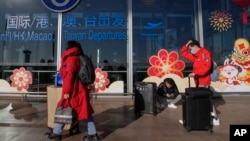Starting on Thursday, January 5, passengers leaving China will have to undertake a COVID-19 test within 48 hours of travel to Australia and show evidence of a negative result.
Officials in Canberra said the measure is in response to the significant wave of infections in China and the “potential for emerging viral variants in that country.”
Australia is following other countries in imposing the restrictions on travelers leaving China. They include India, Malaysia, Spain, the United Kingdom and the United States.
The Canberra government has said the arrangements are precautionary and temporary.
Federal Health Minister Mark Butler told local media Monday that he was concerned about “an absence of comprehensive information about the [COVID-19] situation in China,” especially the lack of genomic sequencing being shared by authorities in the capital, Beijing.
Australia believes that the sharing of information is vital if the emergence of new variants of the virus is to be identified at an early stage.
Butler told the Australian Broadcasting Corp. Monday that Canberra is in step with other countries, and that “There is no restriction on travel from China. All we are asking is that there be a COVID test submitted before departure.”
He described this as a “modest, balanced measure in line with countries across North America, Europe and Asia — pretty much all of the countries to which we would usually compare ourselves have done something similar to what we have down, or exactly what we have done, and we are confident will give us that access to information that the World Health organization has said is currently lacking.”
Butler said he was not aware of any reaction from China regarding the mandatory testing policy that will come into force on January 5.
COVID-19 has previously been a source of friction between Australia and China. In 2020, the former center-right Prime Minister Scott Morrison demanded an inquiry into the origins of the virus that was first detected in China.
The call infuriated the government in Beijing, and bilateral relations rapidly deteriorated. There are also disagreements over China’s stance on Taiwan, which it regards it as its own territory, and China’s increased military tensions in the South China Sea. Australia has also been critical of China’s human rights record, including crackdowns on pro-democracy protests in Hong Kong and China’s abuse of its Uighur Muslim minority.
Restrictions were imposed by China on Australian commodities, including coal, wine and barley. Beijing was accused of economic coercion, while claims of “anti-China hysteria” were made against Australia.
Diplomatic ties appear to be improving since the election in May of a center-left government in Canberra with several high-profile meetings of senior government officials.
Prime Minister Anthony Albanese said in December that while Australia sought stability and cooperation with China, its biggest trading partner, there would also be disagreements.
The latest government data has shown about 15,000 COVID-19 infections are being reported each week in Australia.




